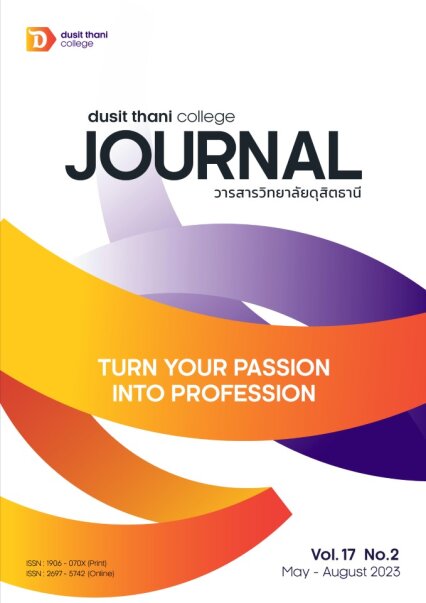การเพิ่มประสิทธิภาพในกระบวนการทำงานของพนักงานแผนกแม่บ้านในอุตสาหกรรมบริการด้านโรงแรม
Main Article Content
บทคัดย่อ
บทความวิจัยนี้มีวัตถุประสงค์เพื่อเพิ่มประสิทธิภาพในกระบวนการทำงานของอุตสาหกรรมบริการด้านโรงแรม ประเภทโรงแรมขนาดกลาง มาตรฐานโรงแรมระดับ 4 ดาวแห่งหนึ่งในจังหวัดนครสวรรค์ โดยนำหลักการศึกษางานและการวิเคราะห์กระบวนการมาประยุกต์ใช้ เพื่อศึกษาขั้นตอนการไหลของวัตถุดิบ เครื่องมืออุปกรณ์ และพนักงาน โดยมุ่งเน้นศึกษาการทำงานของพนักงานแผนกแม่บ้านในห้องพักแบบ Deluxe room แบบเตียงคู่ ด้วยแผนภูมิกระบวนการไหลและแผนภาพจำลองเส้นทางการเคลื่อนย้าย ก่อนประยุกต์ใช้หลักการวิเคราะห์ Why-Why และเทคนิค ECRS เพื่อลดความสูญเปล่าในกระบวนการดำเนินงาน พบว่า การทำงานในห้องพักแบบ Deluxe room แบบเตียงคู่ กิจกรรมทั้งหมดก่อนการปรับปรุงมีจำนวนทั้งสิ้น 67 กิจกรรม หลังการปรับปรุงลดลงเหลือ 51 กิจกรรม ลดลงจำนวน 16 กิจกรรม (ร้อยละ 23.88) ระยะทางก่อนการปรับปรุง มีระยะทางรวม 63.58 เมตร หลังการปรับปรุงลดลงเหลือ 21.70 เมตร (ร้อยละ 65.87) เวลารวมในการทำงานก่อนการปรับปรุงมีเวลารวมทั้งหมด 1,384 วินาที หลังการปรับปรุงลดลงเหลือ 1,235 วินาที (ร้อยละ 10.77) คิดเป็นต้นทุนการทำความสะอาดห้องที่ลดลง 24,090 บาทต่อปี
Article Details

อนุญาตภายใต้เงื่อนไข Creative Commons Attribution-NonCommercial-NoDerivatives 4.0 International License.
นโยบายการพิจารณากลั่นกรองบทความ
- บทความวิจัยและบทความวิชาการทุกเรื่องที่จะได้รับการตีพิมพ์ต้องผ่านการพิจารณากลั่นกรองโดยผู้ทรงคุณวุฒิ (Peer Review) ในสาขาที่เกี่ยวข้อง จำนวน 3 ท่าน/บทความ
- บทความ ข้อความ ภาพประกอบและตารางประกอบที่ลงตีพิมพ์ในวารสารเป็นความคิดเห็นส่วนตัวของผู้เขียน กองบรรณาธิการไม่จำเป็นต้องเห็นด้วยเสมอไป และไม่มีส่วนรับผิดชอบใด ๆ ถือเป็นความรับผิดชอบของผู้เขียนแต่เพียงผู้เดียว
- บทความที่จะได้รับการตีพิมพ์จะต้องไม่เคยตีพิมพ์ เผยแพร่ที่ใดมาก่อน และไม่อยู่ระหว่างการพิจารณาของวารสารฉบับอื่น หากตรวจสอบพบว่ามีการตีพิมพ์ซ้ำซ้อน ถือเป็นความรับผิดชอบของผู้เขียนแต่เพียงผู้เดียว
- บทความใดที่ผู้อ่านเห็นว่าได้มีการลอกเลียนหรือแอบอ้างโดยปราศจากการอ้างอิง หรือทำให้เข้าใจผิดว่าเป็นผลงานของผู้เขียน กรุณาแจ้งให้กองบรรณาธิการวารสารทราบจะเป็นพระคุณยิ่ง
เอกสารอ้างอิง
Akkharaprathomphong, P. (2009). Waste reduction with ECRS principle. Retrieved from https://cpico.wordpress.com.
Aroonkriengkrai, P. (2020). Future of travel: Where is the future of tourism in the era of COVID-19? Retrieved from https://www.creativethailand.org/view/article- read?article_id=32496&lang.
Athikulrat, K. and Jangruxsakul, S. (2021). Increasing in lean production efficiency: A case study of photo frame manufacturing company. Engineering Journal of Siam University. No.22 (Vol.1), 11-18.
Boonprasom, N. (2016). A new dimension of tourism: Single lady travelers. Southeast Bangkok Journal. Volume 2, 125.
Boonwang, P. (2013). An application lean concept for waste reduction in production case study of ABC company. Master thesis. Burapa University.
GSB Research. (2018). Hotel business situation in 2017. Retrieved from https://www.gsb.or.th/getattachment/dae8495d-7374-4fcc-9648-
Kuaites, T., Thueanphae, T. and Chanthranapasawat, N. (2021). Reduce waste of working process in the hotel service industry by flow process chart. Journal of King Mongkut's University of Technology North Bangkok. No.31 (Vol.1), 180-192.
Ministry of Tourism and Sports. (2021). Annual report 2020 Ministry of Tourism and Sports. Retrieved from https://www.moj.go.th/attachments/20220622100115_12671.pdf
Ogura, H. (2002). Why-Why Analysis. (2nd ed.) Technology Promotion Association (Thailand-Japan).
Pongchairerks, P. (2012). A Summary of Methods Engineering and Its Real Applications. Journal of Industrial Education. No.9 (Vol.1), 22-29.
Rawangwong, S., Homkhiew, C., Sani, S., Rodjananugoon, J. and Tehyo, M. (2020). Efficiency improvement in assembly rubber wooden toys using motion and time study and principles of ergonomics: A case study of a sample factory. Princess of Naradhiwas University Journal. No.12 (Vol.2), 97-112.
Ruengtaweesil, J. (2022). Summary of hotel and accommodation business trends. Retrieved from https://www.lhbank.co.th/
getattachment/57f3e813-139c-4ae3-8534-c57df0979079/economic-analysis-Industry-Outlook-2022-Hotels-2022
Singh, A. (2015). Hotels Housekeeping Innovative Trends and Modern Practices-An overview. Journal for Studies in Management and Planning. 1 (3) 2015. 540-548.
Wongwan, K. and Laosiritaworn, W. (2017). Productivity improvement in door-window production using motion and time study techniques. Engineering Journal Chiang Mai University. No.24 (Vol.2), 23-35.


